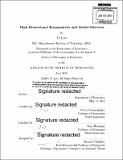| dc.contributor.advisor | Victor Chernozhukov and Jerry Hausman. | en_US |
| dc.contributor.author | Luo, Ye, Ph. D. Massachusetts Institute of Technology | en_US |
| dc.contributor.other | Massachusetts Institute of Technology. Department of Economics. | en_US |
| dc.date.accessioned | 2015-09-17T19:04:51Z | |
| dc.date.available | 2015-09-17T19:04:51Z | |
| dc.date.copyright | 2015 | en_US |
| dc.date.issued | 2015 | en_US |
| dc.identifier.uri | http://hdl.handle.net/1721.1/98686 | |
| dc.description | Thesis: Ph. D., Massachusetts Institute of Technology, Department of Economics, 2015. | en_US |
| dc.description | Title as it appears in MIT Commencement Exercises program, June 5, 2015: Essays in high-dimensional econometrics and model selection. Cataloged from PDF version of thesis. | en_US |
| dc.description | Includes bibliographical references. | en_US |
| dc.description.abstract | This dissertation consists of three chapters. Chapter 1 proposes a new method to solve the many moment problem: in Generalized Method of Moments (GMM), when the number of moment conditions is comparable to or larger than the sample size, the traditional methods lead to biased estimators. We propose a LASSO based selection procedure in order to choose the informative moments and then, using the selected moments, conduct optimal GMM. My method can significantly reduce the bias of the optimal GMM estimator while retaining most of the information in the full set of moments. We establish theoretical asymptotics of the LASSO and post-LASSO estimators. The formulation of LASSO is a convex optimization problem and thus the computational cost is low compared to all existing alternative moment selection procedures. We propose penalty terms using data-driven methods, of which the calculation is carried out by a non-trivial adaptive algorithm. In Chapter 2, we consider partially identified models with many inequalities. Under such circumstances, existing inference procedures may break down asymptotically and are computationally difficult to conduct. We first propose a combinatorial method to select the informative inequalities in the Core Determining Class problem, in which a large set of linear inequalities are generated from a bipartite graph. Our method selects the set of irredudant inequalities and outperforms all existing methods in shrinking the number of inequalities and computational speed. We further consider a more general problem with many linear inequalities. We propose an inequality selection method similar to the Dantzig selector. We establish theoretical results of such a selection method under our sparsity assumptions. Chapter 3 proposes an innovative way of reporting results in empirical analysis of economic data. Instead of reporting the Average Partial Effect, we propose to report multiple effects sorted in increasing order, as an alternative and more complete summary measure of the heterogeneity in the model. We established asymptotics and inference for such a procedure via functional delta method. Numerical examples and an empirical application to female labor supply using data from the 1980 U.S. Census illustrate the performance of our methods in finite samples. | en_US |
| dc.description.statementofresponsibility | by Ye Luo. | en_US |
| dc.description.tableofcontents | Chapter 1. Chapter 2. Chapter 3. Selecting informative moments via LASSO -- Core determining class : construction, approximation, and inference -- Summarizing partial effects beyond averages. | en_US |
| dc.format.extent | 180 pages | en_US |
| dc.language.iso | eng | en_US |
| dc.publisher | Massachusetts Institute of Technology | en_US |
| dc.rights | M.I.T. theses are protected by copyright. They may be viewed from this source for any purpose, but reproduction or distribution in any format is prohibited without written permission. See provided URL for inquiries about permission. | en_US |
| dc.rights.uri | http://dspace.mit.edu/handle/1721.1/7582 | en_US |
| dc.subject | Economics. | en_US |
| dc.title | High-dimensional econometrics and model selection | en_US |
| dc.title.alternative | Essays in high-dimensional econometrics and model selection | en_US |
| dc.type | Thesis | en_US |
| dc.description.degree | Ph. D. | en_US |
| dc.contributor.department | Massachusetts Institute of Technology. Department of Economics | |
| dc.identifier.oclc | 920686382 | en_US |
